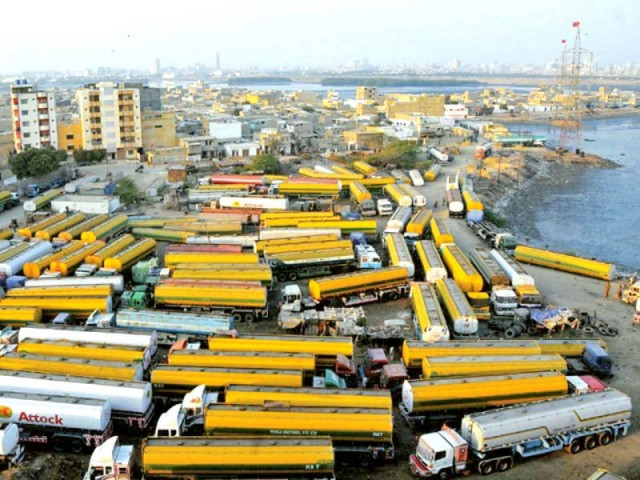Fuel shortage feared as tankers stop supply
Karachi to remain largely unaffected as a couple of lobby groups go on strike

They (oil tanker operators) restored supplies to petrol filling stations in Karachi after the Sindh government invited them for talks, which would be held on Tuesday (April 4). PHOTO: FILE
“Petrol pumps across the country will run dry by Sunday evening,” Oil Tankers Contractors Association Senior Vice Chairman Shams Shahwani said, claiming it was the legitimate and largest lobby group of oil transporters in the country.
He revealed that they had contacted Punjab and Sindh government officials to seek withdrawal of the new 16% sales tax on oil tankers, which came into effect on Saturday. They, however, remained reluctant to address the issue.
“We will continue the strike till provincial governments issue a notification for withdrawal of the tax,” he said.
According to Shahwani, each oil tanker pays Rs10,500 in taxes and duties when it goes from Karachi to Khyber-Pakhtunkhwa and returns back.
He said the contractors in his association supplied oil across the country on behalf of 18 oil marketing companies, including the leading ones.
Echoing similar views, the chairman of another association of the same name - the Oil Tankers Contractors Association, Suleman Tareen, said they would remain on strike until the tax was withdrawn.
However, they restored supplies to petrol filling stations in Karachi after the Sindh government invited them for talks, which would be held on Tuesday (April 4).

“We may restore supplies to remaining parts of the country by Monday,” Tareen said.
He said members of his association were ready to pay the newly imposed tax, but they wanted to understand the mechanism as to who would collect the tax and when and where.
“We will not pay the tax from our pocket; it would be the oil marketing companies which would bear the cost,” he remarked.
The sales tax had been imposed months ago in the current fiscal year, but its collection was put off to avoid any oil crisis in the country.
All Pakistan Oil Tankers Owners Association Chairman Akram Durrani, however, distanced his group from the wheel-jam strike.
“Have you seen any petrol pump in Karachi showing signs of strike?” he asked and stressed that they would not allow any oil supplying group to create fuel crisis in the country.
“We are also against taxes and have never allowed tax authorities to deduct any levies from our service invoices,” he said, also claiming that his association was the largest oil transporter in the country.
Pakistan Petroleum Dealers Association Chairman Abdul Sami Khan pointed out that every petrol pump had reserves for about two to three days. So, oil shortage, if occurred, would be visible after two to three days.
He, however, insisted that there were slim chances of oil scarcity in Karachi as transporters had agreed to restore supplies to the city - the commercial and industrial hub of the country.
Pakistan State Oil (PSO), the largest oil marketing company with market share of over 50%, announced in a statement that “the company is striving hard to ensure that the supply of petroleum products remains continue across the country without any hitches.”
“Though the strike is not against PSO and the company has no stake in the matter, PSO’s supply chain is highly vigilant of the situation,” it said.
PSO reiterated its commitment to maintaining uninterrupted fuel supply to meet the country’s fuel and energy needs under all circumstances.
Pakistan is a net importer of oil. It meets 25% of needs through local resources, while rest of the 75% requirement is met through imports.
Karachi, having two sea ports, plays a crucial role in the import and supply of oil to the upcountry.
Published in The Express Tribune, April 2nd, 2017.
Like Business on Facebook, follow @TribuneBiz on Twitter to stay informed and join in the conversation.



















COMMENTS
Comments are moderated and generally will be posted if they are on-topic and not abusive.
For more information, please see our Comments FAQ